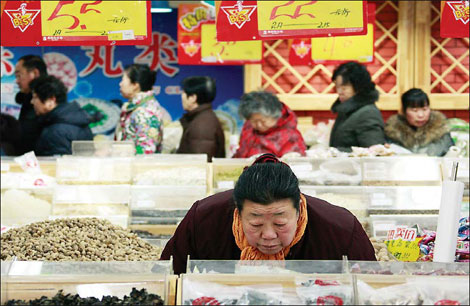Experts forecast soft landing on the horizon
Updated: 2012-02-16 09:28
By Li Jiabao and Zhang Zhouxiang (China Daily)
|
|||||||||||
Lower growth rate to be tempered by rising domestic consumption
BEIJING - China's economy is expected to make a soft landing in 2012, buoyed by the great potential of domestic demand, economists said on Wednesday.
|
 |
|
Shoppers at a grocery market in Huaibei, Anhui province. The country's consumer price index in 2011 averaged 4.3 percent. Economists expect the figure to be lower this year. [Photo/China Daily] |
"China will probably achieve a soft landing in 2012 with GDP growth of 8 to 8.5 percent, while the Western economies are struggling for recovery," said Chen Fengying, director of the Institute of World Economic Studies at the China Institutes of Contemporary International Relations.
Li Pumin, spokesman for the National Development and Reform Commission, said on Wednesday: "China's economy will maintain a steady and quite fast growth pace for a long period, since the nation's ongoing industrialization and urbanization will stimulate domestic consumption and increase spending power, thus expanding domestic demand."
Chen said that the key factors for economic growth all show that a soft landing is ahead.
"Compared with the average 5.4 percent rate in 2011, the consumer price index in 2012 will almost surely be falling," she said.
The CPI last month was 4.5 percent, slightly higher than 4.1 percent in December.
"But January was unusual because of the Spring Festival and a long holiday. Taking everything into consideration, we can safely conclude that the CPI has already peaked."
The purchasing managers' index, another key indicator, also provides a clue.
The PMI reached its lowest level, at 49, in November, but it rebounded to 50.3 last month, and the improving trend is likely to continue, Chen said.
Jin Baisong, an expert at the Chinese Academy of International Trade and Economic Cooperation, said a hard landing is "almost impossible".
"Many are pessimistic about China's economy because they fear the government's macro-control policies might 'burst a bubble'. That might apply to other countries, but not to China, where the government is taking administrative, not market measures, which means it has everything under control."
However, the economy is under great external pressure, as the European debt crisis and the slow recovery of the US economy have added uncertainty to the global economic outlook, Chen said.
China's exports in January fell 0.5 percent year-on-year to $149.9 billion, and imports dropped by 15.3 percent to $122.7 billion, leading to a trade surplus of $27.2 billion, according to the General Administration of Customs.
Wang Haifeng, director of international economics at the Institute for International Economic Research, a think tank under the NDRC, said China's economic growth will have "a reasonable slowdown" this year.
"The economy grew too fast in the past decade and a slowdown will help the country adjust its economic structure and allocate more resources to projects involving social welfare and social security."
Wang added that China's exports will keep growing "quite fast this year and remain a strong force for economic growth", while domestic demand, driven by expanding consumption, will play a more important role in generating GDP growth.
Lan Lan contributed to this story.
Related Stories
Property market set to make soft landing 2010-11-22 07:47
China heading for soft landing: Economist 2011-07-18 10:36
Conference Board sees soft landing 2011-08-17 09:46
'Soft landing' for Chinese economy? Tightening moves matter 2010-11-29 10:31
- Accenture opens lab for R&D
- Culture to be pillar industry
- Third-party auto insurance open to foreign firms
- Wen vows to speed up fiscal, financial reforms
- Alibaba seeks Yahoo CEO after talks: insider
- Experts: EU statement opens door to status
- China's FDI falls 0.3% in Jan
- Assembling ideas for Ikeas in China









